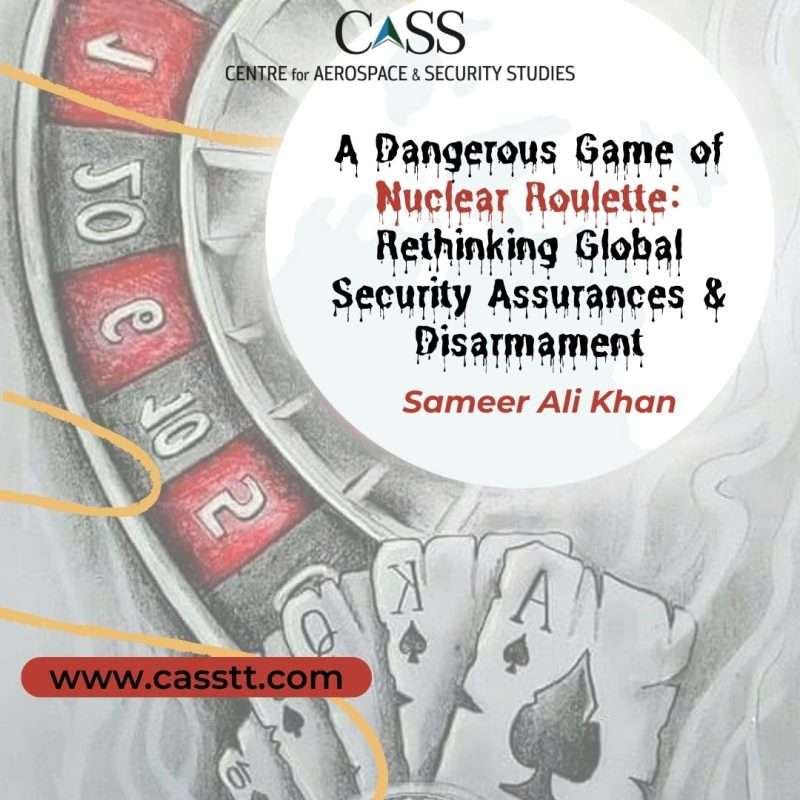The ultimate bargain of the nuclear Non-Proliferation Treaty (NPT) includes a commitment from non-nuclear weapon states (NNWSs) to refrain from developing nuclear weapons. In return, nuclear weapon states (NWSs) promise disarmament and access to civil nuclear technology. NNWSs also demanded legally binding assurances against threats or attacks involving nuclear weapons. However, this proposition never became part of the NPT despite the Non-Aligned Movement’s (NAM) ardent support. The United States (US), then-USSR, and the United Kingdom (UK) were unwilling to extend such assurances as part of the NPT since France and China had nuclear weapons but were not initially ready to join the treaty. Even though the two states joined later, such assurances have not gained universal and formal footing.
In the past year, Russia was seen as implying threats of using nuclear weapons in the ongoing war in Ukraine. Western capitals took due note of the threats and unequivocally condemned Russia’s stance. Last year, majority of the Group of 20 (G-20) states noted that, ‘the use or threat of use of nuclear weapons [was] inadmissible.’
Unfortunately, Russia is not the only nuclear-armed state to issue such threats.
On 5th November, Israel’s Heritage Minister suggested that dropping a nuclear bomb on the Gaza Strip could be one of Israel’s options in the war. The minister, who admittedly has no role to play in Israel’s security decisions, was immediately sacked. Widespread condemnations from nuclear and non-nuclear weapon states followed and Arab nations revived their calls for a Middle East Nuclear Weapon-Free Zone (MENWFZ). Though there were condemnations from the US and Germany; UK, France, and the European Union (EU) remained conspicuously silent on the Minister’s nuclear threat.
The Israeli Minister’s statement is not only viewed as declaration of its nuclear capability – which is otherwise known as ‘the bomb in the basement’ – but also as a doctrinal proclamation that Israel could use nuclear weapons against a non-nuclear weapon state. While the significance of the minister’s admission of nuclear capability and doctrinal proclamation might be downplayed due to the lack of official authority behind the statement, such pronouncements reignite feelings of vulnerability among NNWSs in the face of nuclear threats. The advocacy by Arab nations for a MENWFZ is aligned with their strategic goal of advancing regional disarmament and mitigating the nuclear threat posed by Israel. Yet, this issue has lingered unresolved since the late 1960s, largely due to the enduring support Israel’s nuclear programme receives from influential allies in the West, which complicates the prospect of addressing these concerns effectively.
Other Nuclear Weapon Free Zone (NWFZ) arrangements mitigate nuclear threats to their member states through guarantees of Negative Security Assurances (NSAs) from the NWSs. These NSAs legally oblige the NWSs to not use nor threaten to use nuclear weapons against state parties to the NWFZ. While NWFZs provide a feasible approach to addressing this issue, this regionalised approach will inevitably leave out some states; hence, the need for a global approach that addresses the concerns of all the NNWSs without distinctions and conditions. For example, despite receiving security assurances, Ukraine is at the centre of a prolonged conflict. The Ukrainian delegation at the UN General Assembly’s First Committee highlighted that the security assurances provided to their country failed to deter Russia due to a lack of immediate consequences for violations. Moreover, the delegation added that, ‘at the global level, we must all invent a more compelling deal than security assurances… we are paying a far dearer price for peace, stability and security in the world.’
If anything, the Ukrainian statement reflects the lack of trust that the NNWSs have in the security assurances provided by NWSs. This distrust and disenchantment with the existing non-proliferation arrangement is also reflected in NNWSs inclination towards the Treaty on Prohibition of Nuclear Weapons (TPNW). While the NWSs are unanimous in their opposition to the TPNW, its widespread adoption by NNWSs is likely to increase pressure on the former to ensure fairness in the existing nuclear bargain i.e., making good on their promises of disarmament or at the least strengthening security assurances. Otherwise, TPNW’s explicit ban on use and threat of use of nuclear weapons – without conditions – would appear a better option compared to NPT’s arbitrary promise of disarmament.
In a study over the psychology of assurance, Janice Gross Stein, asserts that, ‘one goal of assurance might be to try to establish a greater sense of fairness in the relationship between nuclear haves and have-nots by increasing the obligations of the former toward the latter.’ Conversely, if nuclear threats against the ‘have-nots’ become a norm, they are more likely to feel strongly that they are in an unfair relationship where their rights and aspirations (towards disarmament) are not respected.
Ukraine in Europe and Palestine in the Middle East highlight the vulnerability of non-nuclear weapon states. Regional solutions, in the form of NWFZs, may be difficult to achieve given overt and covert presence of nuclear weapons in both regions. The situation in Europe is further complicated by the presence of a military arrangement like NATO and the role of nuclear umbrella that the member states enjoy. This is why the issue of NSAs needs to be dealt at a larger scale without distinction and discrimination. Regionalising it will inevitably leave out some states while restricting it to the NPT would forego assurances from four nuclear weapon states outside the NPT – including Israel.
Sameer Ali Khan is a Senior Research Associate at the Centre for Aerospace & Security Studies (CASS), Islamabad, Pakistan. He can be reached at [email protected]
Design Credit: Mysha Dua Salman





